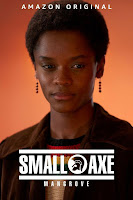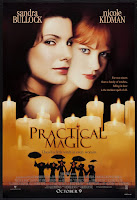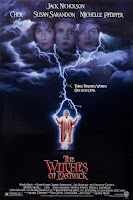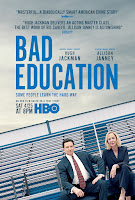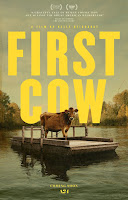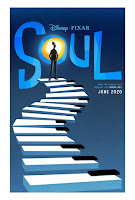RIP SOPHIE
Movies
Mangrove (2020)
I guess the people who said that this is just the prestige version of one of those movies you'd watch in social studies class are right. But I also found this pretty rousing—Steve McQueen movies tend to feel pretty considered, Mangrove included, so this movie doesn't really capture the thrilling liveliness of collective action, but it definitely captures the heart of it. And once the film transitions to the courtroom, it's basically all great, since the closed-off environments of a court of law play very, very well to McQueen's strengths as a director. Also, I don't know what social studies classes you were in, but none of mine had any interest in (or sympathy for) radical politics. Grade: B+
Lovers Rock (2020)
I'm not good at dancing, and I don't like dancing (these two are probably related), and I don't ever have very much fun at the kind of party this movie depicts, i.e. the kind where the whole point is to lose yourself in dance and song and not to have the boring, discursive conversations I'd rather be having. So it's a sheer testament to the filmmaking magic on display here that I watched this movie, where pretty much the entire thing is one such party, and spent the whole runtime wanting very badly to be there—not dancing, of course, but just soaking up the energy in the room, watching the liberation of the dance floor. The whole movie is electrifying and communicates better than most movies I've seen the sheer joy of being completely embodied in a moment shared by an entire community. Also, to whatever degree these Small Axe works are a series (television or otherwise), the best argument in favor of that is how this plays in immediate succession to Mangrove and the way it so thoroughly shows what Mangrove spends so long telling: the vital importance of these third spaces, especially within marginalized communities. I'd imagine you'd be completely fine watching either in isolation of the other, but there really is something to be said about the accumulation of meaning when viewing them in sequence. Grade: A-
Kajillionaire (2020)
The only other Miranda July work I'm familiar with, Me and You and Everyone We Know (this blog's second post ever! don't read it—it's terrible!), I like well enough, but this caught me completely off-guard. As with that other film, Kajillionaire is basically about finding love and connection in the context of a modern world that makes the traditional expressions of human connection either embarrassing or difficult, and this movie is also very much in Miranda July Mode, where everything is kind of just slightly off-kilter, like the dialogue and character version of a Dutch Angle, which could be theoretically alienating and apparently is for some viewers, based on reviews I'm seeing. But I dunno, I ended up finding this really moving, and I personally connected pretty strongly with the way that Evan Rachel Woods's character (Old Dolio) has to basically reprogram herself after an upbringing with parents who have given her this completely skewed, transactional view of the world (it's a family of grifters, more or less, who are constantly scamming, perhaps out of a paranoia that the world's end at the hands of an earthquake are imminent) in order to begin to form connections with people in the Real World. My parents are actually great and love and care about me and were (still are) always very open about that, but the idea that you can grow up within a community (conservative/evangelical Christianity for me) with a fundamentally warped understanding of the world that affects your ability to make real connections with people—that resonated. There's a specificity to July's vision that I don't want to take away from (it's female, it's queer, it's very Los Angeles), but evangelicalism, how I've been trying to shake it out of my brain for the past 10-12 years, is what I ended up thinking about here, and July's ethos is open-handed and compassionate enough that I can't imagine she'd be too alienated by that train of thought. Love each other, folks. Grade: A
Miss Juneteenth (2020)
Definitely feels like an indie movie that in some ways seems to the movie's detriment: the at-times shaky screenplay and the somewhat stiff performances (outside of Nicole Beharie, who is fantastic) make this movie a little rough around the edges. But as a quiet story about one generation unintentionally passing the toxicity of their upbringing onto the next, this movie works when it counts, and the relationship between the mother, who won the pageant when she was a teen, and her daughter, who is unenthusiastic about the pageant, is wonderfully realized—especially with Beharie as the mother, who, again, does great work. Also, this movie has a really terrific evocation of a very particular milieu, i.e. a black Texas community. The only other example of this I can think of is the last couple seasons of Friday Night Lights, and even that's filtered through a pretty white perspective. Nice to see a depiction that doesn't come from a place of difference. Grade: B
FernGully: The Last Rainforest (1992)
I mistakenly believed this was a Don Bluth feature, which means that I was expecting a mostly mediocre film with some signs of life in the animation. It is not a Don Bluth feature, and it is not mediocre. It is a truly dreadful, utterly uninspired film with animation that only rises above direct-to-VHS levels when it is focused on the Tim-Curry-voiced villain (the villain animation is actually quite good, as is Curry's extremely Curry-esque performance—possibly the only two good things about this movie). The movie substitutes dreary musical numbers in place of character development, the environmental mythology is paper-thin, the big sexy heart-throb human is a mullet-sporting bro named Zak, and Robin Williams honest-to-glob RAPS. Also, for a movie basically conceived as a delivery system for environmental messages, its environmentalism is pretty dopey in the way that a lot of '90s environmentalism aimed toward children tended to be—maybe I am just a callous monster, but "Pollution/industry makes the cute animals sad" is the flimsiest possible rationale for environmental justice I can imagine, and this movie shows absolutely zero interest in interrogating the reasons why industry happens. I'm not saying this has to go full anti-capitalist, but at least a Lorax-level acknowledgement of the role that the ideologies serving at the altar of Production and Expansion have in the destruction of the world would have been nice. Instead, all we got are some dumb dudes who think it's fun to chop things up. Really talking about the issues here, FernGully. Did not enjoy. Will not be checking out its actually direct-to-VHS sequel. Grade: D
Fritz the Cat (1972)
Unbearably juvenile. Probably the most juvenile feature that I've seen from Bakshi, which is saying something. Setting a precedent is setting a precedent, but in the wake of decades of much more impressive adult animation, I don't know why I'm supposed to be impressed by animals having a threesome in a bathtub. The movie has sketches of interesting themes, like the opening when some white girls are being performatively woke toward a black character and end up being incredibly patronizing, or the sequence when Fritz briefly becomes a radical leftist but then ducks out of town when his revolutionary rhetoric results in police violence against his (mostly black) followers—the film seems to halfheartedly be interesting in satirizing the way that white kids from middle-class backgrounds try on the aesthetics of revolution without actually investing in any of the work done by true leftists (usually people of color). But just as often, it also seems to be lampooning leftism as a whole, resulting in this mealy-mouthed centrism that's being provocative without being brave enough to truly take a political stance of consequence—I'd like to think if Bakshi was smart enough to recognize the shallow, fashionable radicalism among white kids he would be smart enough to see the parallel in the shallow, fashionable centrism of the edgelord postures in this movie, but apparently not. Anyway, per usual with Bakshi, this film is also super misogynist, and I'm not super inclined to be charitable to even what good politics are here since they're awash with the same bare contempt for women that animates a lot of Bakshi films (though not usually as strongly as it does here). And speaking of animation, there are some moments of visual inspiration, like the shot of the crow snapping his fingers to Bo Diddley, but this is by far the most stylistically tidy Bakshi movie I've seen, which means that it lacks the usually really interesting way that Bakshi turns his tiny budgets into go-for-broke transgressive mixing of media and styles. This one looks like any old '70s cartoon, just with more sex. I've been wanting to see this movie for a while because I have a weird fascination with Bakshi. But this was pretty much garbage. Grade: D+
Television
Steven Universe, Season 4 (2016-2017)
I still miss the focus on Beach City, but the way that the show continues to expand its mythology is at least consistently engaging. A lot of shows start to feel thinner as they get bigger, but Steven Universe does a good job of enriching itself as it grows. This season is focused most on exploring the series's villains and their underlying ideology of hierarchy and supremacy, and through that. The show plays around with some ethical dilemmas (Steven feels guilt about having been unable to turn a gem before it shattered, for example, and there's a little bit of angst about how Rose Quartz may have committed war crimes), but it never really truly commits to ambiguity, and at its heart, the show remains a story about a group of fundamentally good people changing the world through compassion and fighting those who won't change, which is good (and often very good), though probably not the most interesting version of itself it could have been. Grade: B+
Books
Luster by Raven Leilani (2020)
Given the crowdedness of the field, there's a real uphill climb for a debut novel about a young artist in the publishing industry who has sexual misadventures while learning stuff about herself and her own maladaptive tendencies. But Leilani's debut works by sheer verve of voice. This book is compulsively readable, a real page-turner by the standards of literary fiction, solely because Leilani's prose just shimmers and moves. The content of the book itself I am relatively indifferent to, though there are a few interesting dynamics re: the young black protagonist hooking up with an older white man who has recently adopted a black girl. The books energy flags quite a bit toward the middle and end, which is sort of appropriate thematically, as it represents a period in which the protagonist herself stagnates and becomes directionless. But after the salvo of the opening 100-ish pages, it's hard not to feel that the book is coasting somewhat. That said, Leilani's prose remains electric throughout, and the book is never not engaging, even when it slows down. I guess this isn't a glowing recommendation, but I enjoyed my time with the novel, so... Grade: B
